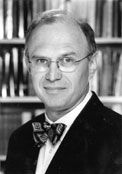2002 – Miroslav Volf
Is there any hope of embracing our enemies? Of opening the door to reconciliation? Yale University theologian Miroslav Volf argues in his book “Exclusion & Embrace: A Theological Exploration of Identity, Otherness, and Reconciliation” that exclusion of people who are alien or different is among the most intractable problems in the world today.
Volf’s exploration of exclusion and his suggestions for change have earned the 2002 Louisville Grawemeyer Award in Religion. The annual $200,000 prize is given jointly by Louisville Presbyterian Theological Seminary and the University of Louisville to the authors or originators of creative works that contribute significantly to an understanding of “the relationship between human beings and the divine, and ways in which this relationship may inspire or empower human beings to attain wholeness, integrity, or meaning, either individually or in community.”
A Croatian by birth, Volf takes as a starting point for his analysis the recent civil war and “ethnic cleansing” in the former Yugoslavia, but he readily finds other examples of cultural, ethnic and racial conflict to illustrate his points.
Exclusion happens, Volf argues, wherever impenetrable barriers prevent a creative encounter with the other. Modern western societies typically recite their histories as “narratives of inclusion,” but Volf points out that these narratives omit certain groups who “disturb the integrity of their ‘happy ending’ plots.” Such narratives invite long and gruesome counter-narratives of exclusion, such as the brutal histories of slavery and of the decimation of Native American populations.
Most proposed solutions to the problem of exclusion have focused on social arrangements-what kind of society can be created to accommodate individual or communal difference? Volf’s focus is not on developing social strategies or programs, but rather on showing new ways for people to understand them and their relation to their enemies. He helps people to imagine new possibilities for living without violence, injustice and deception.
Volf-who had just delivered a lecture on the topic of “Exclusion and Embrace” to a prayer breakfast at the United Nations when the first hijacked plane hit the World Trade Center-will present a lecture and receive his award in Louisville during the first week of April 2002.
About the winner
Volf is the Henry B. Wright Professor of Theology at the Yale University Divinity School in Connecticut, where he has taught since 1998. Born in Croatia, he is also visiting professor of systematic theology at Evangelical Theological Faculty in Osijek, Croatia, where he began his theological training in 1977 and subsequently taught theology from 1984-1991.
Following his studies in Croatia, Volf earned degrees from Fuller Theological Seminary (M.A.) in Pasadena, Calif., and the University of Tuebingen (Doctorate, 1986 and 1994) in Germany.
Prior to an appointment on the Yale theological faculty, Volf served as co-editor and later as editor of the Croatian journal, “Izvori” (Christian Monthly), from 1979 until 1989 and then as professor of systematic theology at Fuller Theological Seminary (1991-1998).
Volf is the author of more than 50 theological articles that have been translated into numerous languages including Dutch, Croatian, Spanish and German, and more than 150 editorials and articles that have been featured in scholarly journals as well as in popular publications such as Christianity Today and Christian Century.
He also has written nine books, including “After Our Likeness: The Church as an Image of the Triune God,” “A Spacious Heart: Essays on Identity and Togetherness,” “A Passion for God’s Reign: Theology, Christian Learning, and the Christian Self,” and his award-winning “Exclusion and Embrace: A Theological Exploration of Identity, Otherness, and Reconciliation.”


